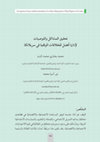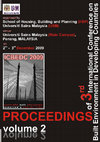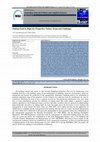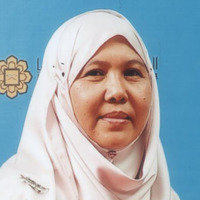Papers by nasiahm mohamad

State of Qatar - Ministry of Endowments and Islamic Affairs - General Directorate of Endowments, 2024
Waqf is a crucial instrument for providing socio-economic assistance in
various sectors, includin... more Waqf is a crucial instrument for providing socio-economic assistance in
various sectors, including social finance, health, education, and socioreligious practices. It indicates that there are different levels of effectiveness in fulfilling socioeconomic needs, and this could be primarily associated to the effective and proper management of waqf. Post-amendment to the Waqf Act in Sri Lanka in 1982, there has been a significant increase in disputes and issues related to waqf in Sri Lanka, involving its managers, stakeholders, and various parties. As a result, over 5,000 waqf cases are currently unresolved at the Waqf Board of Sri Lanka, involving numerous accusations of corruption, mismanagement, misappropriation, and underuse of mosques and waqf properties. The challenges can be connected to the inadequate management of Sri Lanka’s fundamental waqf administration and legal system. This study
employs a qualitative approach for data collection and analysis to understand the issues. It gathers data from various sources, including books, theses, journal articles, and other relevant materials, especially legislation and legal reports. This study primarily focuses on providing brief descriptions of case studies and waqf conflicts in Sri Lanka. The findings include the most common categories of disputes, their primary causes, methods for dispute prevention, the waqf tribunal’s resolution and settlement procedures, and the relevant laws. To further advance waqf in Sri Lanka, this study evaluates the operation of waqf tribunals in other jurisdictions. It is recommended that the Board may consider waqf disputes highlighted by amendments to the law and effective administrative procedures of the tribunal to minimize and prevent waqf
conflicts, with the assistance of Shari’ah scholars. This study indicates that the recommendations might assist waqf administrators in Sri Lanka in attaining appropriate waqf management. Sri Lanka needs to develop a proficient waqf dispute resolution system.

Kajian secara rambang mendapati tiada satu panduan yang selaras di antara semua Mahallat di UIAM ... more Kajian secara rambang mendapati tiada satu panduan yang selaras di antara semua Mahallat di UIAM dalam menangani kes barang yang dijumpai, barang tinggalan dan barang rampasan. Setiap pengetua asrama mengunakan budi-bicara masing-masing dalam menguruskan barang-barang tersebut. Adalah dirasakan amat perlu untuk menyelaras dan menyediakan satu polisi yang jelas bagi mengelakkan masalah pengurusan dan juga ketidakadilan dalam mengendalikan kes yang melibatkan pelajar terutamanya. Kertas kerja ini akan dibahagikan kepada dua perbincangan utama iaitu prosedur dalam pengurusan barang jumpaan dan ketinggalan dan keduanya proses dalam mengendalikan barang yang dirampas. Biarpun, merampas barang pelajar yang melanggar peraturan tidak lagi dijalankan, tetapi adalah dirasakan kajian berkenaan hal ini masih relevan memandangkan masih banyak barang yang tersadai di setor-setor ole sebab ketiadaan polisi menanganinya. Dalam mencari satu panduan yang jelas, kertas kerja ini cuba melihat kaedah dan prinsip pamakaian semasa dan undang-undang Islam di dalam hal barang dijumpai dan rampasan. Kajian ini akan mengambil kira mana-mana prosedur semasa, peruntukan undang-undang serta prinsip Islam sebagaimana yang diberikan oleh ulama'-ulama terkini terutamanya di dalam kes mengendalikan barang jumpaan. Metodolgi yang diambil ialah dengan mengenalpasti mana-mana polisi yang ada di UIAM yang melibatkan Mahallat, Bahagian Hal EhwalPelajar, Unit Undang-Undang serta Unit Keselamatan. Tujuan kajian ini adalah untuk memastikan polisi yang ada agar lebih selaras, jelas serta mengikut peraturan termasuklah undang-undang Islam.

Malaysia has recently announced a few amendments to the present laws governing the stratified pro... more Malaysia has recently announced a few amendments to the present laws governing the stratified properties including the introduction of new law to manage and maintain the properties. The objectives of the amendments among other things are to provide a better delivery system in the public sector as well as to have an orderly housing laws and efficient management of high-rise building in Malaysia. The much awaited laws, though well welcome, create considerable doubts and worries in its implementation as regards to the commitment that may be given by all relevant parties in managing the special type of properties. This paper seeks to highlight some of the lingering doubts shadowing the implementation of the laws and policies and it is submitted that those areas require reasonable and due cognizance from all, in particular, the major key-players dealing with the matter. It is argued that the effectiveness and the success of the implementation will highly depend on the commitment of all involved in the industry. The law gives more power to property owners to self regulate the management of the properties which at the same time call for a serious and highest commitment from the property owners. The future demands in management of high-rise building does not require for financial contribution from all owners, but at the same time it compels for a serious commitment towards a collective management from all strata owners.

2014 4th International Conference on Engineering Technology and Technopreneuship (ICE2T), 2014
The electricity supply industry restructuring has started in the 1980s in Chile and UK. It spread... more The electricity supply industry restructuring has started in the 1980s in Chile and UK. It spreads to the Latin American countries such as Argentina and accelerated in the 1990s in diverse forms in the USA, Australia, the Nordic and Asian countries. The main drive for electricity market restructuring in UK came from the government's belief that the advantages of competition among energy suppliers and it offers wider choice for customers. Meanwhile, in the countries of Asia, the restructuring is driven by a need for rapid expansion of capacity in generation, transmission and distribution. Three electricity supply models considered are Single Buyer, Pool Model and Bilateral Model. This paper evaluates the economic benefits from customer and electricity provider sides based on case study created.

There are many disputes as to the ownership of islands which are located at the border of the sta... more There are many disputes as to the ownership of islands which are located at the border of the states. The general principle under the Malaysian land law is all land belongs to the state except alienated land or reserve land. This paper discusses the issue of island whether any individual may claim that he is the owner of the land as he happens to be the first person who occupies the land. Another issue relating to this principle is that can any state claim she is the owner of any island as she happens to be the first states whose people has occupied the island or who happens to rule the island. This paper seeks to discuss the issues from the Islamic land ownership perspective as well as discussing the problem within the contect of the Malaysian land law. Specifically this paper discusses the viability of the application of the principle of ihya al mawat to the issue of new deserted land or islands.

The government of Malaysia continues to introduce new initiative towards strengthening the multi-... more The government of Malaysia continues to introduce new initiative towards strengthening the multi-ethnic. The history shows that there were cases where questions on the rights and position of the respective ethnics have been raised including the position of Islam as the religion of the Federation of Malaysia. The Federal Constitution 1957 contains provision which clearly states that articles 3 of the Federal Constitution positions Islam as the official religion of the country. There are many perceptions and interpretations revolve around these two issues. Some address the permission to practice other religions as providing equal rights to all religions, including Islam. This paper promotes that 1 Malaysia concept implies that as the Federal Constitution has clearly prescribed for Islam as the religion of the Federation, as such; the position of Islam is higher than other religions. In this respect, this paper traces the various aspects where the government is entrusted to provide and argues that the government is not burdened with a duty to ensure equality of rights and treatment in all aspects concerning religion to others. Thus, the assurance that other religions may be practiced is a permission allowing the non Muslim to practice their religions without putting a responsibility on the government to ensure equal rights are given to all religions. This paper looks at the meaning and spirit of Article 3 of the Federal Constitution and the right and duties assigned to the Yang Di Pertuan Agong to protect the position of Islam as the religion of the Federation.
Corporate Social Responsibility is the way businesses manage their activities to produce an overa... more Corporate Social Responsibility is the way businesses manage their activities to produce an overall positive impact through economic, environmental and social actions. Previously, Malaysia’s corporate environmental management strategies were largely reactive in nature, such as through the compliance of legal emission standards. However, due to various factors including that of climate change commitment, there is now a shift in Malaysia towards green markets which foster a more proactive stance on environmental management. Considering that environmental sustainability is one of the key components within the eco-friendly business practices, it is the aim of this article to look into some recent developments within the law in Malaysia that promote strategies aiming at encouraging companies to find solutions to their environmental impact and curbing carbon emission.

In the process of urban planning there should be a proper system of land management. There are a ... more In the process of urban planning there should be a proper system of land management. There are a few primary areas which need to be considered in the urban land management system such as the aspect of development control, land tenure, land acquisition, land administration, land taxation and many others. In this paper a study will be made on the issue of squatters and housing as this is also related to urban land management. Being a developing country undoubtedly Malaysia is facing a crisis of urban squatters which has become a challenge for the local authorities as well as the federal government. This paper will address this issue by examining the Malaysian housing policy towards providing quality and affordable housing for the lower income group in urban areas. Discussion on this topic will relate to the application of various laws and regulations pertaining to local authorities, planning and land law. It is the aim of this paper to present the legal issues relating to squarrets and their appeal for equitable rights and opportunities for housing. This paper also seeks to present the approaches which have been used by the Malaysian government, especially the state of Selangor and the Federal Territory of Kuala Lumpur to achieve the objective of "zero squarrets."

Tanah adalah aset yang penting bagi setiap individu. Nilai tanah diukur bergantung kepada kandung... more Tanah adalah aset yang penting bagi setiap individu. Nilai tanah diukur bergantung kepada kandungan dan penggunaan tanah. Artikel ini membincangkan apakah unsur-unsur penting pembangunan tanah berdasarkan perundangan dan praktis yang diamalkan di Malaysia serta prinsip-prinsip pembangunan menurut Islam bersandarkan data-data sekunder yang diambil dari pandangan dan penulisan terdahulu juga autoriti primer yang dirujuk kepada al-Quran dan Hadis. Penulisan ini juga melihat sejauh manakah peruntukan peraturan yang ada dapat memastikan kelestarian pembangunan tanah tanpa berlaku kerosakan kepada manusia atau alam sekitar. Secara umum, perundangan dilihat tidak dapat membendung kemusnahan akibat kerakusan manusia. Undang-undang ciptaan manusia yang diguna pakai ternyata gagal mendisiplin serta menghukum mereka yang tamak dan menyalahgunakan amanah dan peranan mereka sebagai khalifah di muka bumi ini. Kertas kerja ini membincangkan keperluan memastikan mereka yang terlibat dalam pembangunan tanah takut kepada hukuman Allah SWT. Kecanggihan teknologi dan ketinggian ilmu yang diukur melalui sijil dan pangkat semata-mata gagal melahirkan manusia yang amanah dalam melaksanakan tanggungjawab untuk membangunkan tanah seterusnya membina negara. Memahami bahawa manusia adalah khalifah dan hamba Allah yang memikul amanah serta pemilikan tanah adalah bersifat sementara merupakan pra syarat bagi mereka yang terlibat dalam agenda pembangunan. 1 Perkataan Teras : Tanah, pembangunan, amanah, Islam, integriti, Pengurusan Pembangunan Islam Klasifikasi JEL : Q15, R14, R52, Z12

Strata living contribute in many ways to new features in urban development. In built environment ... more Strata living contribute in many ways to new features in urban development. In built environment theory housing developers are expected to provide conducive environments to promote a better life for residents. One of the encouraging environments is proper management of strata building. Consequently developers who develop strata buildings are expected to discharge their duties and obligations to manage the strata building efficiently and professionally. However under the Malaysian law, the duties to manage strata buildings are not only impose on developers but these responsibilities shall be shared by the house owners too. This paper analyses the problems dealing with strata in Peninsula Malaysia and the governing laws and regulations on strata. This paper then seeks to see to what extent the existing laws and regulations in Peninsula Malaysia facilitate the developers and purchasers as well as the local authority to regulate the living in strata buildings. It will focus on the rights and responsibilities of the developers that developed the strata projects, the community living within the strata as well as the government in managing the affairs within the strata. Discussions on these points are expected to reveal whether the existing laws are sufficient to manage the strata building. Discussions in this paper will involve various types of strata developed in Peninsular Malaysia, for instance condominiums, apartments, flats, serviced apartments and gated communities.
International Review of Management and Business Research, Jun 1, 2013

Maintenance of strata properties is unique as it requires common contribution from all strata pur... more Maintenance of strata properties is unique as it requires common contribution from all strata purchasers. The contributions which sometimes referred as charges, levies or fee receive mixed reactions from the purchasers or owners for many various reasons. Some of the issues relate to ignorance on the term "Charges" and how the money is used. Sometimes, an owner chooses not to pay to protest against any dissatisfaction over services rendered by the management or their agent. While some may agree to the Charges, others ignore the important of having to pay for future capital expenses. Some of the owners argue that the Charges are sufficient to cover whatever cost required in the maintenance of the building thus additional contribution is not necessary. This paper analyses the laws relating to strata as to how sinking fund is defined and managed in order to provide a basis to regulate sinking fund in Malaysia. This study adopts a qualitative content analysis approach in which legal provisions, case laws and other secondary data are analysed in understanding legal framework and policy on sinking fund. The result shows that there are specific purposes for which sinking fund may be spent or utilized by the developers, Joint Management Body or the Management Corporation (MC). The laws also provide the mode for determining the amount of the contribution, make it compulsory for an account to be opened for the collection as well as making it an offence if the management fails to comply with the laws. It is observed that there are considerable improvements in the newly introduced Strata Management Act 2013. Nevertheless, enhancements are still necessary to create awareness among the strata owners to contribute to sinking fund. No doubt, community living requires cooperation and sense of belonging from all especially the owners of the properties.

Uploads
Papers by nasiahm mohamad
various sectors, including social finance, health, education, and socioreligious practices. It indicates that there are different levels of effectiveness in fulfilling socioeconomic needs, and this could be primarily associated to the effective and proper management of waqf. Post-amendment to the Waqf Act in Sri Lanka in 1982, there has been a significant increase in disputes and issues related to waqf in Sri Lanka, involving its managers, stakeholders, and various parties. As a result, over 5,000 waqf cases are currently unresolved at the Waqf Board of Sri Lanka, involving numerous accusations of corruption, mismanagement, misappropriation, and underuse of mosques and waqf properties. The challenges can be connected to the inadequate management of Sri Lanka’s fundamental waqf administration and legal system. This study
employs a qualitative approach for data collection and analysis to understand the issues. It gathers data from various sources, including books, theses, journal articles, and other relevant materials, especially legislation and legal reports. This study primarily focuses on providing brief descriptions of case studies and waqf conflicts in Sri Lanka. The findings include the most common categories of disputes, their primary causes, methods for dispute prevention, the waqf tribunal’s resolution and settlement procedures, and the relevant laws. To further advance waqf in Sri Lanka, this study evaluates the operation of waqf tribunals in other jurisdictions. It is recommended that the Board may consider waqf disputes highlighted by amendments to the law and effective administrative procedures of the tribunal to minimize and prevent waqf
conflicts, with the assistance of Shari’ah scholars. This study indicates that the recommendations might assist waqf administrators in Sri Lanka in attaining appropriate waqf management. Sri Lanka needs to develop a proficient waqf dispute resolution system.
various sectors, including social finance, health, education, and socioreligious practices. It indicates that there are different levels of effectiveness in fulfilling socioeconomic needs, and this could be primarily associated to the effective and proper management of waqf. Post-amendment to the Waqf Act in Sri Lanka in 1982, there has been a significant increase in disputes and issues related to waqf in Sri Lanka, involving its managers, stakeholders, and various parties. As a result, over 5,000 waqf cases are currently unresolved at the Waqf Board of Sri Lanka, involving numerous accusations of corruption, mismanagement, misappropriation, and underuse of mosques and waqf properties. The challenges can be connected to the inadequate management of Sri Lanka’s fundamental waqf administration and legal system. This study
employs a qualitative approach for data collection and analysis to understand the issues. It gathers data from various sources, including books, theses, journal articles, and other relevant materials, especially legislation and legal reports. This study primarily focuses on providing brief descriptions of case studies and waqf conflicts in Sri Lanka. The findings include the most common categories of disputes, their primary causes, methods for dispute prevention, the waqf tribunal’s resolution and settlement procedures, and the relevant laws. To further advance waqf in Sri Lanka, this study evaluates the operation of waqf tribunals in other jurisdictions. It is recommended that the Board may consider waqf disputes highlighted by amendments to the law and effective administrative procedures of the tribunal to minimize and prevent waqf
conflicts, with the assistance of Shari’ah scholars. This study indicates that the recommendations might assist waqf administrators in Sri Lanka in attaining appropriate waqf management. Sri Lanka needs to develop a proficient waqf dispute resolution system.